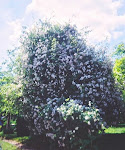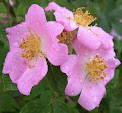Chapter 1 (extract 1) of "Roses for English Gardens" by Jekyll and Mawley (1902), in which Miss Jekyll contrasts the new roses of the late Victorian era with the old garden favourites such as Damask and Provence roses.
------
CHAPTER I
GARDEN ROSES NEW AND OLD
New Garden Roses
One of the most distinct and wholesome effects of the spread of garden knowledge and love of flowers that has filled the land of late years is the demand for good garden Roses. By the term "garden Roses," is meant Roses for ordinary garden use, though the word has a more exclusive use in the schedules of Rose Societies, where it means any Roses other than those that are classed as show kinds. In this case the more rigid distinction is of use, though in the garden it does not concern us in the least, for it naturally happens that a grand show Rose is often a grand garden Rose also.
But in the usual jargon of horticulture the word "garden Rose" makes one first think of Damask and Provence or Cabbage Roses, of Moss Roses, of Sweet Brier and Scotch Brier, of Cinnamon Rose and Rosa lucida, of China Rose, and of the old climbing cluster kinds; in short, of all the older favourites that will grow readily in any garden in answer to reasonable care and preparation.
It is only of late years, since an increased recognition of the delights of the garden has spread anew throughout Britain, and is rapidly extending through her colonies, that any notable additions have been made to the garden Roses. But our best Rose growers have not been slow to perceive how gladly their good new garden Roses have been welcomed; the success of these has encouraged further effort, and whereas a few years ago lists of new Roses were mostly attractive to specialists, and consisted almost exclusively of Hybrid Perpetuals and Teas, the new Rose lists of to-day include kinds that appeal to every one who loves a garden.
The reason for the older limitation may be easily understood, for whereas success in growing the show Roses depends, to begin with, either on the possession of a good Rose soil, or on those qualifications of knowledge, determination, and command of money that can create one where it does not exist, the wants of the free and "garden " Roses are so comparatively modest, they are so accommodating and so little fastidious, that with very moderate preparation and encouragement they can be made to succeed in much poorer soils. Then it is but few that aspire to the honours of the show table, while nearly every one who is master of a rood of land now desires to enjoy it as a garden.
--
See also:
Turner's Crimson rambler
Multiflora roses
Dwarf polyantha roses (Pompom roses)
The wichuriana roses (Rosa wichuriana hybrids)
The rugosa roses (Rosa rugosa)
Some new tea roses and species roses for gardens
Sweet Briars (Rosa rubiginosa) and the Penzance hybrids


No comments:
Post a Comment